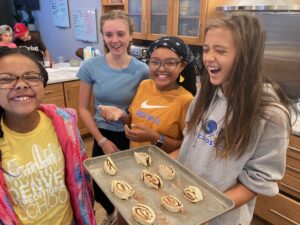Training Today’s Learners To Be The Hired Guns Of Tomorrow

Freelancer. Free Agent. Independent Contractor. Consultant. Hired Gun. Slice it anyway you like–this is the future of work.
This is the “Gig Economy.” The world where contract work is the new norm. Experts say this already represents 34% of the current American workforce and estimates are that this will increase to 40% – 50% by 2020.
As educators, how do we prepare today’s students for a future employment landscape that is vastly different from what we ourselves have known? Yes, it’s about skills – both technical and interpersonal. But it’s also really a new way of thinking about our operation in the working world.
Our students will need to continually learn about and apply current developments in technology, global collaboration, market opportunities and emerging industries to win in this new economy. How do we give students both the mindset and the skillset to not only survive, but thrive in this 21st-century gig galaxy?
Let’s go beyond the norm and regardless of grade level, program or specific academic content area, help all learners be prepared for the future of work in the new economy. Educators and schools may consider implementing the following six concepts.
Startup Mindsets
Startups go way beyond a business euphemism. Startups can be business ventures, non-profits, projects, websites, e-business avenues and any number of endeavors. Students need to learn how to start something from nothing and take it public. If it’s a business, then yes take it to market. A project, however, is about taking one’s idea and seeing it through to a public conclusion. This is just one of the literally hundreds of reasons why Project-Based Learning is so crucial for all learners to experience. But beyond initiating and implementing, we also all need the high levels of learning that come from failure. Yes, it’s the new popular “F” word in education. But beyond the learning that does take place when an idea does not produce the desired results, it’s also about the practice. Learners need start-up repetitions. Imagine how good our future ideas could be if we have a chance to experiment with them as students in less threatening and ultimately less crucial environments. Think Shark Tank School, where students are constantly pitching their project ideas and soliciting public and community support in order to be successful.
Client Management Over Classroom Management
Independent contract work requires us to continually seek and secure new work. One has to both develop new clients and hopefully retain existing ones. Our students will need to develop these client-based skills and experiences long before they have to do it for their livelihood. So, our classroom and program leaders need to find as many community partners that need work completed that students could perform. I bet many local non-profits would love to have a new website, video, logo, social media campaign, event, brochure and so much more that students could execute. Learners will benefit from the experience of trying to meet someone else’s real world expectations for a finished product that will be used publicly. They will be able to live customer/client service in real time while working to establish ongoing professional relationships, networks and projects. Additionally, having actual client-based work beefs up anyone’s portfolio and resume. One Stone does a great job of this.
Professional Applications
Although technology continues to evolve, there are some foundational applications that are directly related to freelancing in the new economy. Some things, like Google Applications, are just a given. However, anyone who operates as a freelancer will have distinct advantages if they have at least working knowledge and basic abilities in applications related to graphics (Photoshop, Illustrator), web management (WordPress, Drupal, Joomla), and video editing (Final Cut Pro, Premier). Independent Contractors will require branding, marketing and communication skills related to creating and maintaining their own website and other digital content. Pro app skills are almost a prerequisite to operating in this economy, and they’re certainly a component of operating successfully. Finally, knowing how to use and articulate specific professional applications are the “badges” that will have direct economic power. Teaching these to learners in school will also upskill their digital portfolios. It is true that much of our technology will continually evolve due to greater automation, smart technology and digitization. However, the need to know how to both create and launch ideas, as well as share, sell and show them through professional applications will be vital.
Social Media Literacy
I have been advocating for years now that we need to not only allow students to use and access social media as part of their schooling, but explicitly teach it just like any other literacy. We need to teach, model, challenge and practice social media literacy. Learners will need to truly experience the impact of likes, follows, and retweets of their work and ideas vs. just the social. Every company, organization, non-profit and small business has realized that they have to have a social media presence. We need to show our students that they too will need a social media presence – beyond the social – in order to compete and connect. Using social media for professional applications will help our students understand important things such as analytics, audience reach, SEO’s, personal branding, feedback, customer service, public relations, event planning and so much more. Also, we can expand to include many new, emerging or now more important literacies. These include, but are not limited to financial literacy, social-emotional literacy, information literacy, digital literacies and multicultural literacy,
Keep That Cheese Moving
We are all creatures of habit. Students, and adult learners too, love to sit in the same space, work with the same people and ultimately follow patterns of daily work. The problem is that our addiction to habit and predictability (schedules, processes, expectation, etc.) runs counter to the nature of work in the future, which will require people to be much more flexible, adaptive and less attached to a norm. Our students will be working in environments that will be constantly disrupted and re-created. Learning to have one’s cheese moved is more important than ever and directly related to developing a startup mindset.
At the high tech, project-based high school that I co-founded, we were always trying to “move our students’ cheese.” We realized that we had to create just enough change, chaos and even disruption in order to make them prepared for “different.” For example, we used to reverse the daily schedule (backwards days), move the furniture around and have pop presentations. Schools could also look at starting school in a way that will foster culture, creativity, collaboration, engagement and more (see SmartStart Your School).
UnSchool School
Dr. Tony Wagner of Harvard has suggested that “the culture of school is radically at odds with the culture of learning necessary for innovation.” I would suggest that almost everything that is traditionally school-oriented runs almost counter-intuitive to adaptive and disruptive environments in the new economy. Learning and work need to feel a lot less like school and a lot more like the real world. There are countless ways to rethink school, but one can start with just this foundational list: blended learning, hybrid and flex scheduling, gap years, #20Time projects, innovation diplomas, lame duck days, micro and short-term courses, democratization, social entrepreneurship, community-based classrooms, place-based learning, work-based learning, student-led schools and programs, digital badging, student voice and choice, redesigning learning spaces, ditching homework and textbooks, new literacies and more. If it feels like school, chances are you need to unschool it.
In the end, how will this affect us as educators? Lesson Design needs to become Project Design. Classroom Management needs to become Project Management. The need is here now, and many our students are unknowingly poised to have an entirely different (but much needed) educational experience.
For more, see:
- Getting Students Ready for the Gig Economy
- Want Authentic PBL? Take Students to the Farm
- The 5 Core Components of K-12 Entrepreneurship Education
Stay in-the-know with all things EdTech and innovations in learning by signing up to receive the weekly Smart Update. This post includes mentions of a Getting Smart partner. For a full list of partners, affiliate organizations and all other disclosures, please see our Partner page.




0 Comments
Leave a Comment
Your email address will not be published. All fields are required.